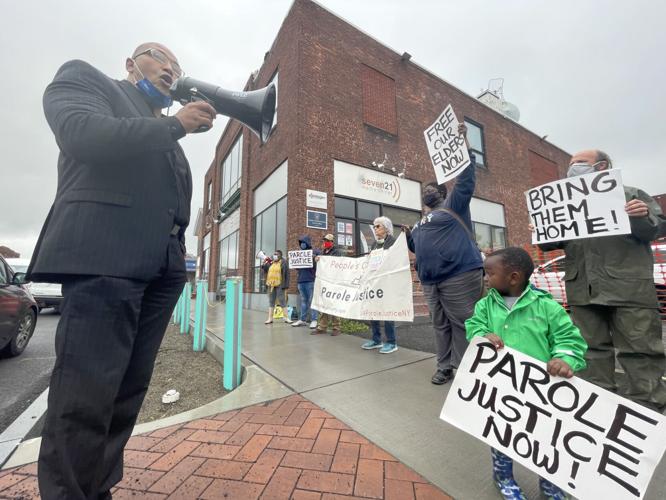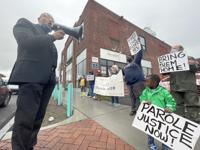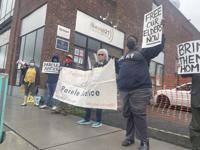KINGSTON — Last weekend, Anthony Dixon saw his friend, Kay, for the last time.
Kay was a brother — a man Dixon formed a bond with for over a decade while incarcerated together at Green Haven Correctional Facility in Beekman, Dutchess County.
Kay, who spent 52 years of his life in prison, died last week at the age of 77. He was denied medical leave two weeks ago.
Kay’s daughter, who did not know her father or that he was incarcerated, saw him for the first time before his body was cremated.
“He was trying to get in contact with her for 52 years,” Dixon said. “He did not know his daughter would one day come in contact in the basement of a funeral home ready for cremation ... The bill we are talking about has to do with life and death and reuniting families back together again.”
Dixon, now 59, and originally from Queens, served in eight state prison facilities from the North Country down to Fishkill in the Hudson Valley during his 32 years in incarceration. He was released five years ago in August.
Lawmakers remain split as a growing number of Democrats push before the end of current legislative session to enact parole reform, which could lead to the release of hundreds of incarcerated people in the state’s prison system, through the passage of The Fair & Timely Parole Act (S.1415/A.4231) and Elder Parole (S.15A/A.3475).
The measures are intended to give timely parole hearings to release people who have served years in the state’s correction system, participated in educational and other reform programs with the intent of rehabilitiation into society.
More than a dozen formerly incarcerated New Yorkers, family members of incarcerated people and activists chanted “Bring them home!” and “Free them now!” outside Sen. Michelle Hinchey’s office in Kingston on Wednesday evening.
Several drivers enthusiastically honked their horns when driving by the rally. The group cheered into megaphones and thrust their fists in the air in response.
For about an hour, the group implored Hinchey, D-Saugerties, who took office in January, to become a co-sponsor of both measures to help move the issue forward before the end of session next month. Hinchey is the first Democrat to represent the 46th District in seven years.
Inno Powell, a member of Rise Up Kingston, recalled her entry into the state’s prison system at 15. Powell was denied parole once, but was forever changed by her cellmate, Kristen, who was imprisoned since the age of 14 for protecting herself against a man threatening her life.
Her case took place in Texas.
“She had been sitting there for over a decade — ever since she was a child,” Powell said. “We need to let these people come home. Yes, it tears families apart, but imagine if a person isn’t mentally stable, imagine what that’s doing to them? ... Now they’re cutters and doing heinous stuff to themselves. My bet is they didn’t need prison in the first place, they needed help. We need your help, Sen. Hinchey.”
The bill reforming elder parole, if passed, would require inmates over 55 years old who have served 15 or more consecutive years be considered for parole regardless of their crime or sentence.
A person denied parole can typically reapply for release after two additional years in prison. Dixon was denied twice.
Every year a person is incarcerated takes an average of two years off their life. About 1 in 6 of the 31,000-plus people incarcerated in state correctional facilities will be 55 years old or older in the next decade, according to the Vera Institute of Justice.
The average life expectancy for a person who spends their life imprisoned is 57, Dixon said.
“If they are still a risk to society, they will stay in, but if they are not, they should be considered for parole release,” he continued. “How would you like everybody to recognize you based on the worst thing you ever did in life? Why aren’t we optimistic to say a person should be judged by the best thing they did in life?”
The Fair & Timely Parole Act would amend executive law mandating the state’s Parole Board to release eligible incarcerated New Yorkers on parole unless the person presents a current and unreasonable risk, or a risk that cannot be mitigated by parole supervision, according to the bill.
Representatives from Hinchey’s office did not respond to multiple requests for comment Thursday about the senator’s intent to become a co-sponsor or details of her position on either measure.
Jesse Meyer, Hinchey’s district director, spoke to the group after their presentation Wednesday and said Hinchey plans to vote in favor of both the Fair & Timely Parole Act and Elder Parole legislation.
“I hear the sentiments that are out here in terms of how many issues we have with the criminal legal system,” Meyer said, adding Hinchey voted for other Democratic-led measures this session including the Marijuana Regulation and Taxation Act and the Walking While Trans Ban.
Hinchey would have attended the rally, Meyer said, but could not because of legislative session in Albany, which started at 3 p.m. Wednesday.
“There’s a lot that needs to go get done, and she will be voting for Fair and Timely Parole and Elder parole when they come up,” Meyer said.
He did not know why the senator does not co-sponsor the legislation.
He encouraged the constituents to fill out a form with their opinions or thoughts for Sen. Hinchey, and that he would pass on their plea encouraging her to co-sponsor the legislation.
Data shows the state is a leader among other U.S. states in re-incarcerating people on technical parole violations, which include any violation of a condition of parole outside a felony or misdemeanor offense, according to state Penal law.
Republican legislative leaders and representatives have repeatedly spoken out this session against both parole reform and measures to change the current system.
Parole officers have also argued against the legislation, saying state management pressures officers to not re-incarcerate a person as quickly or for technical violations.
Parolees can be confined to local jails for 100 days while the state makes a determination about their case after allegedly breaking a rule.
Formerly incarcerated New Yorkers, lawmakers and advocates have heightened their calls for the Legislature to enact parole reform before the end of session next month, which could lead to the release of hundreds of incarcerated people in the state’s prison system.
Other parole reform measures are also proposed, including the Less Is More Act, (S.1144/A.5576) that would broaden terms to revoke a person’s parole or community supervision, and limit incarcerating people on minor technical parole violations.
The bill is aimed at reforming due process during parole revocation hearings, intending to remove the burden from parole officers and codify into law the actions a parole officer can legally take.
Gov. Andrew Cuomo and executive aides continue to review the proposed parole reform legislation. The governor’s office would not take a stand in supporting or rejecting the measures.
The state had 112 people held in local jails on technical parole violations as of March 31, according to the state Department of Corrections and Community Supervision.
The state Department of Corrections and Community Supervision does not comment on proposed legislation.













